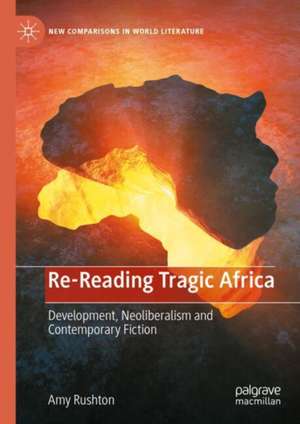Re-Reading Tragic Africa: Development, Neoliberalism and Contemporary Fiction: New Comparisons in World Literature
Autor Amy Rushtonen Limba Engleză Hardback – iun 2024
Din seria New Comparisons in World Literature
- 15%
 Preț: 697.32 lei
Preț: 697.32 lei - 8%
 Preț: 442.30 lei
Preț: 442.30 lei - 15%
 Preț: 584.10 lei
Preț: 584.10 lei - 15%
 Preț: 697.47 lei
Preț: 697.47 lei - 15%
 Preț: 636.76 lei
Preț: 636.76 lei - 15%
 Preț: 697.47 lei
Preț: 697.47 lei - 15%
 Preț: 585.40 lei
Preț: 585.40 lei - 9%
 Preț: 756.03 lei
Preț: 756.03 lei - 15%
 Preț: 529.28 lei
Preț: 529.28 lei - 15%
 Preț: 699.45 lei
Preț: 699.45 lei - 15%
 Preț: 498.79 lei
Preț: 498.79 lei -
 Preț: 386.99 lei
Preț: 386.99 lei - 15%
 Preț: 525.20 lei
Preț: 525.20 lei - 15%
 Preț: 579.84 lei
Preț: 579.84 lei -
 Preț: 383.12 lei
Preț: 383.12 lei -
 Preț: 388.52 lei
Preț: 388.52 lei - 18%
 Preț: 892.28 lei
Preț: 892.28 lei - 15%
 Preț: 639.08 lei
Preț: 639.08 lei - 15%
 Preț: 690.44 lei
Preț: 690.44 lei - 15%
 Preț: 697.32 lei
Preț: 697.32 lei - 15%
 Preț: 697.32 lei
Preț: 697.32 lei - 15%
 Preț: 699.77 lei
Preț: 699.77 lei - 15%
 Preț: 697.65 lei
Preț: 697.65 lei -
 Preț: 357.49 lei
Preț: 357.49 lei
Preț: 695.85 lei
Preț vechi: 818.64 lei
-15% Nou
Puncte Express: 1044
Preț estimativ în valută:
133.15€ • 139.02$ • 110.20£
133.15€ • 139.02$ • 110.20£
Carte disponibilă
Livrare economică 14-28 martie
Preluare comenzi: 021 569.72.76
Specificații
ISBN-13: 9783031509544
ISBN-10: 3031509544
Pagini: 256
Ilustrații: XI, 195 p.
Dimensiuni: 148 x 210 mm
Greutate: 0.39 kg
Ediția:2024
Editura: Springer International Publishing
Colecția Palgrave Macmillan
Seria New Comparisons in World Literature
Locul publicării:Cham, Switzerland
ISBN-10: 3031509544
Pagini: 256
Ilustrații: XI, 195 p.
Dimensiuni: 148 x 210 mm
Greutate: 0.39 kg
Ediția:2024
Editura: Springer International Publishing
Colecția Palgrave Macmillan
Seria New Comparisons in World Literature
Locul publicării:Cham, Switzerland
Cuprins
1. Introduction: The Danger of the Single Reading.- 2. Reading Africa in the Neoliberal World-System.- 3. The Longer Walk to Freedom: South African Prophecy and Neoliberal Intervention upon ‘Tragic Africa’.- 4. ‘Africa awaits its creators’: Subverting Development Narratives.- 5. Back to Utopia: Retrieving the Past to Reclaim the Future.- 6. Conclusion: Towards a Kind of Paradise.
Notă biografică
Amy Rushton is Senior Lecturer in English at Nottingham Trent University, UK. They have over a decade of teaching experience and have published numerous articles on African literature, neoliberalism, and contemporary cultural representations of mental distress. Amy is currently Chair of the Board for the National Survivor User Network (NSUN).
Textul de pe ultima copertă
Grounded in world-systemic analysis, this book revisits the literary and social implications of ‘tragedy’ in relation to global narratives about Africa and within fiction by writers from the continent. It argues that working through the full complexity of ‘tragedy’ helps to identify and challenge plots that depict Africa as reaching a tragic impasse. Instead, reconsidering tragedy allows for further, related interventions including the implications of narratives of development, the argument for formally engaging with literary texts that present challenging material, reformulations of African political and cultural agency, and the possibilities to be found in utopian thinking. It claims that contemporary fiction helps to scrutinise the familiar big picture of Africa and create space for discussions about wider political and historical commonalities between the continent and the rest of the world. As such, the novels discussed in this study are not simply ‘about’ Africa: these fictional narratives position Africa as a central actor within the global history of late capitalism.
Amy Rushton is Senior Lecturer in English at Nottingham Trent University, UK. They have over a decade of teaching experience and have published numerous articles on African literature, neoliberalism, and contemporary cultural representations of mental distress. Amy is currently Chair of the Board for the National Survivor User Network (NSUN).
Caracteristici
Marks a substantial advance in understanding tragedy and development in African fiction Explores how world-systemic analysis speaks to literary approaches that prioritise historical and cultural specificity Offers close readings of three widely discussed novels across postcolonial studies and African literary scholarship
